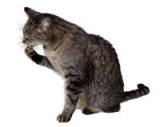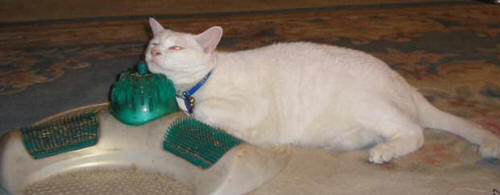|
Need Help?
|
|
Call
1-800-372-3706
to
speak to a Veterinary Behavior Technician |
|
Paws To Speak!
Member Main Menu
|
|
 |
 |
|
Help is at your
fingertips by library, email,
and phone. |
Learn more...
Self Mutilation

Famous Quote
One is never sure, watching two cats washing each other, whether it's affection, the taste, or a trial run for the jugular.
- Helen Thomson -
|
Self-Inflicted Wounds and OCD
Cats
What is it?
Self mutilation may result from excessive licking, chewing,
biting, or pulling out fur. All these actions can lead to skin lesions. What these
behaviors have in common is how difficult it is to interrupt and distract the cat from the
destructive behavior.
|
Medical conditions or
stressful conditions may cause cats to become obsessed
with grooming that ultimately leads to self-inflicted
wounds. |
Why does it start?
While you may think this behavior
seems odd or rare, it is a common
complaint of cat owners. Medical conditions can cause cats
to become seemingly obsessed with
grooming, ultimately leading to
bodily damage.
Self inflicted wounds may begin due
to an underlying medical condition or due to the
cat's inability to cope with physical anxiety
often resulting from a stressful environment. Either way, a
self mutilation habit can become severe
and difficult to change.
What to do
The first step is always a visit your veterinarian for a thorough exam and
diagnostic testing. Because no two cats are alike each case must be evaluated individually and thoroughly. Only a veterinarian
can diagnosis and recommend a comprehensive treatment plan.
If medical conditions are ruled out or treated
and the behavior continues, then a pet behavior history analysis is the next
step. In general, behavior modification can help the cat learn replacement behaviors. The family will
also need to help eliminate the source of stress.
What is OCD?
Cats can develop obsessive compulsive disorders which are
behavior patterns or habits that are difficult to interrupt or stop. After any
underlying medical causes are ruled out or treated, this condition is treated as
a form of mental illness. Behavior medications and modification plans can help
these cats learn replacement behaviors that are not harmful. A veterinary
behavior consultant typically works with the general practice veterinarian on
pet behavioral issues.

|
"Helping you raise a fabulous feline
friend for life." |
|